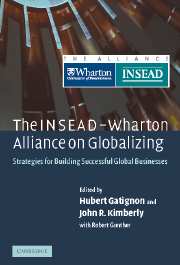Book contents
- Frontmatter
- Contents
- List of figures
- List of tables
- Notes on contributors
- Foreword
- Acknowledgments
- 1 Globalization and its challenges
- Part I Leading the global organization
- Part II Global market participation
- Part III Managing risk and uncertainty
- Part IV Implications and conclusions
- Author index
- Subject index
1 - Globalization and its challenges
Published online by Cambridge University Press: 14 January 2010
- Frontmatter
- Contents
- List of figures
- List of tables
- Notes on contributors
- Foreword
- Acknowledgments
- 1 Globalization and its challenges
- Part I Leading the global organization
- Part II Global market participation
- Part III Managing risk and uncertainty
- Part IV Implications and conclusions
- Author index
- Subject index
Summary
While debates about globalization rage in the media, at international conferences, and in the streets, managers still have work to do. They need to create profitable businesses and generate returns for investors by entering global markets, compete against international rivals, make investments, and find opportunities in the shifting tableau of a world in continuous transformation. And they need to do this in a way that is environmentally and socially responsible. The global arena is where the extraordinary opportunities lie, but it is also where complexity and risk abound.
Although some government leaders may feel they have a choice about whether to participate in this process of globalization, it is not a matter of choice for businesses. All but the most insular business leaders recognize that in a world in which markets are global, they need to be actors on the world stage. In fact, apart from a few wealthy individual investors, firms are the economic entities that must create value across national boundaries. Firms are responsible for producing and delivering the goods and services that benefit the people of the world. And firms are the actors that can create new opportunities for sustainable economic development.
Even as the political debate continues between proponents of globalization and its “discontents,” companies are wrestling day-to-day with the process of globalizing. The debate over globalization is itself part of the context for world business, but managers of global corporations face other complex problems.
- Type
- Chapter
- Information
- The INSEAD-Wharton Alliance on GlobalizingStrategies for Building Successful Global Businesses, pp. 1 - 22Publisher: Cambridge University PressPrint publication year: 2004
- 4
- Cited by



